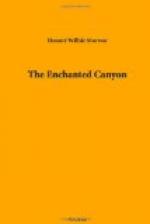Here he nearly lost his balance, for there was a rush of wings close to the back of his head. He started, then looked up carefully. Far above him an eagle’s nest clung to the lonely rock. The purple stratum continued its way to a depression wide enough to give Enoch sitting room. Here he rested for a short moment. The back of the depression offered an easy assent for two or three hundred feet, to the top of another terrace along whose broad top Enoch walked comfortably for a quarter of a mile to the point where the butte projected from the main canyon wall. The slope here was not too steep to climb and Enoch made fair speed to the top.
The view here was superb but Enoch gave small heed to this. To his deep disappointment, there was no sign of life, either animal or vegetable, as far as his eye could reach. He stood, gun in hand, the wind tossing his ruddy hair, his great shoulders drooping with weariness, his keen eyes sweeping the landscape until he became conscious that the sun was low in the west. With a start, he realized that dusk must already be peering into the bottom of the Canyon.
Then he bethought himself of the eagle’s nest. It was a terrible climb, before he lay on a ledge peering ever into the guano-stained structure of sticks from which the eagle soared again at his approach. As he looked, he laughed. The forequarters of a mountain goat lay in the nest. Hanging perilously by one hand, Enoch grasped the long, bloody hair and then, rolling back on to the ledge, he stuffed his loot into his game bag and started campward.
The way back was swifter but more nerve wracking than the upward climb had been. By the time he reached the green shale, Enoch was trembling from muscle and nerve strain. It was purple dusk now, by the river, with the castellated tops of butte and mountain molten gold in the evening sun. When he reached the brittle strata, the water reflected firelight from the still unseen camp blaze. Enoch, clinging perilously to the breaking rock, half faint with hunger, his fingers numb with the cold, laughed again, to himself, and said aloud:
“’. . . . . . . . . . . . . And yet Dauntless the slug horn to my lips I set And blew, Childe Roland to the Dark Tower Came.’”
CHAPTER XII
THE END OF THE CRUISE
“Christ could forgive the unforgivable, but the Colorado in the Canyon is like the voice of God, inevitable, inexorable.”—Enoch’s Diary.
Jonas stood on a projecting rock peering anxiously down the river. Enoch, staggering wearily into the firelight, called to him cheerfully:
“Ship ahoy, Jonas!”
“My Gawd, boss!” exclaimed Jonas, running up to take the gunny sack and the gun. “Don’t you never go off like that alone again. How come you stayed so late?”
“Now the Na-che’s gone I suppose I’ll have a few attentions again!” said Enoch. “How are you, Milton?”




